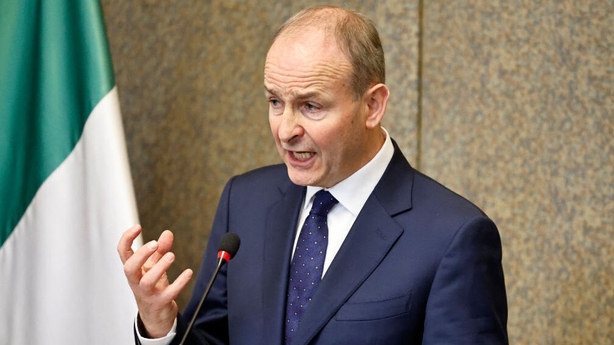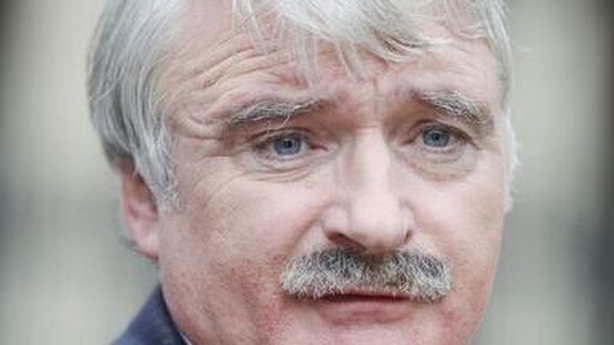Fianna Fáil Senator Lisa Chambers has confirmed that she was part of a party canvass in Dublin city centre last month calling for a Yes vote in the referendums.
The Senator from Mayo has spoken in the aftermath of Saturday's referendum results explaining that she voted No to both proposed constitutional amendments.
Ms Chambers, who is also one of her party’s candidates in the Midland-North-West constituency in the upcoming European Parliament elections, described the result as strong message from women who did not want the word "mother" removed from the Constitution.
However, a social media post from 23 February shows her handing out referendum leaflets on Grafton Street with Minister of State Thomas Byrne.
In the piece filmed by Fianna Fáil, Mr Byrne said that he was out canvassing with colleagues to call for a Yes vote in the two referendums.
Speaking tonight, Ms Chambers said: "Yes, I went out on one canvass at the start of the campaign a few weeks back as I was supportive of a yes vote on the 'Family' question initially, but I changed my mind towards the end of the campaign after listening to the debate as the uncertainty grew over the legal consequences of a yes vote, particularly after reading the AG (Attorney General) advice.
"I was never supportive of the Care amendment for the simple reason that it would have removed the word "mother" from the constitution, not because I don’t want carers recognised in our constitution, because I do."
The Fianna Fáil post on X was reposted earlier today by Ms Chambers’ party and Seanad colleague Erin McGreehan.
Minister @ThomasByrneTD and his Fianna Fáil colleagues were out canvassing in Dublin City Centre recently for a Yes Yes vote in the upcoming referendums on March 8th.
— Fianna Fáil (@fiannafailparty) February 23, 2024
We're asking you to #VoteYesYes, to reflect a more inclusive and equal society. https://t.co/E1MocFikLN pic.twitter.com/AwaIA0wdBa
Earlier, Ms Chambers told RTÉ Drivetime that she had voted No in both referendums having taken issue with the wording of the proposed amendments.
Ms Chambers said she did not tell Fianna Fáil leader Mícheál Martin of her position and did not engage in the campaign as she was not sure which way she was going to vote.
She said she was conscious of the fact that her party, the Government and the opposition were advocating for a Yes-Yes vote.
She said that initially in the Family referendum she held a position to Yes, as she wanted to recognise other family structures.
She also wanted to include carers in the Constitution and said that the intentions behind the questions were positive but "the wording didn't meet the threshold to vote for change".
On the Care referendum, she said that she could never have supported the word mother being taken out of the Constitution.
"It didn't sit right with me, my gut told me that it wasn't the right move."
Ms Chambers described a Yes vote in the Care referendum as meaning taking a bit out and adding in a new section, and she said that while the 1937 wording might be a bit old fashioned, "there's something in that".
She said that Ireland needed to do more to allow people to stay at home if they want to. "I don't think it’s a realistic option for lots of parents, particularly Mums, to stay at home if they want to, and that’s something we need to work on."
She said the Government did its best to deal with those concerns and answer questions, but the Attorney General's advice did not seem in line with answers given by Government ministers, and that people were genuinely unsure.
"If you’re not sure then keep what we have and go back to the drawing board," she said.

Meanwhile, the Tánaiste said he was comfortable with the decision of the people who decisively rejected the two referendums put to them last Friday.
Mr Martin said he accepted the will of the people and that he did not look at the results of the twin referendums as a focus for blame, as "it's the people who decide and you accept it".
He said the proposal to change the Constitution has been on the table since 1996 when a constitutional convention proposed that the article pertaining to women in the home be changed, and again in 2001 followed by an Oireactas committee in 2013 and 2021.
Mr Martin said it has been on the agenda for "a long, long time" and as a Government, they put it to the people who in turn told them they were happy with the existing provisions of the Constitution, or certainly did not accept the provisions being put before them.
Speaking in Co Limerick, he said it was certainly worth reflecting on what transpired, but that he is comfortable with the people making a decision.
He said change had been advocated for more than 30 years and that perhaps it the degree to which the people wanted that change was overestimated.
Mr Martin said he did not accept that the result was a message to Government, but instead a message on a proposition put to the people.
He added that he was not accepting the result as a threat or a means to cause division in Government.
The Tánaiste said it is only the people who can amend the Constitution and not parliament as in other locations, and the courts can also interpret it.
'We should all learn our lesson'
Fianna Fáil MEP Billy Kelleher has said that the referendums on Family and Care were not handled well, from the Government's perspective.
In a debate on RTÉ's Upfront with Katie Hannon, he said the explanations given and the guillotining of debates were part of the reason. He said the lack of pre-legislative scrutiny was something that "we should all learn our lesson from. When you take a proposition to the electorate, to the people, it has to be fully interrogated and debated."
The Ireland South MEP said he himself voted Yes-Yes. He said while he had handed out some leaflets himself: "There was no activity on the ground, to be quite truthful."
He said he had thought the referendums would be carried, but in the last ten days, he said he could sense a fundamental shift.
He said the fact that the Government, along with the main Opposition parties had been supportive of the referendums had undermined "the concept of strong, robust debates and the interrogation of the facts".
"The guillotining of debate and no pre legislative scrutiny is something we should all learn our lesson from"
— Upfront with Katie Hannon (@RTEUpfront) March 11, 2024
Fianna Fáil MEP Billy Kelleher reflects on the two defeated referendums #RTEUpfront pic.twitter.com/TGAhFWMwvt
Aontú leader Peadar Tóibín said the referendum was not a "No" to single parents or co-habiting couples, but a No to Government incompetency.
He described the leaking of legal advice given by the Attorney General the night before the referendum as "murky" and said there were questions to be answered, including by the Minister for Children Roderic O'Gorman who has said the leaking will be investigated.
Billy Kelleher agreed that the publication of the advice could have been a "tipping point" for some other those voting in there referendums, including his party colleague Senator Lisa Chambers.
Peadar Tóibín said that for the Government, the referendum was purely about symbolism. He said people who needed help on the ground wanted respite care and access to home help without having to campaign around the clock for it.

Earlier, Fianna Fáil TD Willie O'Dea admitted that he did not campaign with the Government for a Yes-Yes vote in the recent referendums, and that when he went to cast his ballot on Friday, he voted No to both.
The Limerick City TD said that the referendums were ill considered and badly explained and that there was confusion, but not the type of confusion that people are suggesting existed.
"The 44% turnout shows people had looked at this and had made up their minds, but people were confused as to why when the country had so many problems to be getting on with in relation to lack of housing, healthcare and law and order why the Government were diverting time and energy on these referenda for which there were no popular demand," he said.
Mr O'Dea tweeted this morning that "Fianna Fáil needs to get back to basics and abandon the Hate Speech Bill etc.
"Focus on housing, health and law and order and stop playing to the woke gallery. Start listening to the people, stop talking down to them and stop listening to the out-of-touch Greens and NGOs."
Speaking on RTÉ’s News at One, Mr O’Dea said that there was anti-social behaviour and "horrendous" law and order problems in Limerick which are replicated across the country.
We need your consent to load this rte-player contentWe use rte-player to manage extra content that can set cookies on your device and collect data about your activity. Please review their details and accept them to load the content.Manage Preferences
He said that there was enough law, but too little order in terms of the means to enforce the law.
"The Minister for Justice should be focusing more on that and less on legislation such as preventing hate crime," he said.
Mr O’Dea added that many TDs across the Government felt that they could not enthusiastically support the referendums and were worried about term durable relationships and how the courts were going to interpret it.
On the care referendum, he said that the concerns were over the removal of the word mother from the Constitution.
He said that in his view, this had "a smack of virtue signalling" and he "didn't see anything very substantial in it".
"I didn't actively campaign for the Yes-Yes vote, I didn't feel conscientiously I could. I worried about both referendums," Mr O’Dea added.
He said that to those who asked about it when he was canvassing for the local elections, he did his best to explain it but said that he voted no in both referendums in the ballot box due to his own reservations.
Mr O'Dea added that the result speaks for itself, and many people he met on doors said that they were voting against the Yes-Yes campaign or abstaining because they were unhappy with certain aspects in the way the Government was operating.
He said that he did not know how many in his party held this view, but he felt Fianna Fáil should not have gone along with the referendums.
A more careful considered approach, such as pre-legislative scrutiny and a clearer or simpler way of explaining what was involved certainly would have altered the figures, he said.
"I doubt if anything would have gotten them over the line," Mr O'Dea added.
Additional reporting: Cathy Halloran







